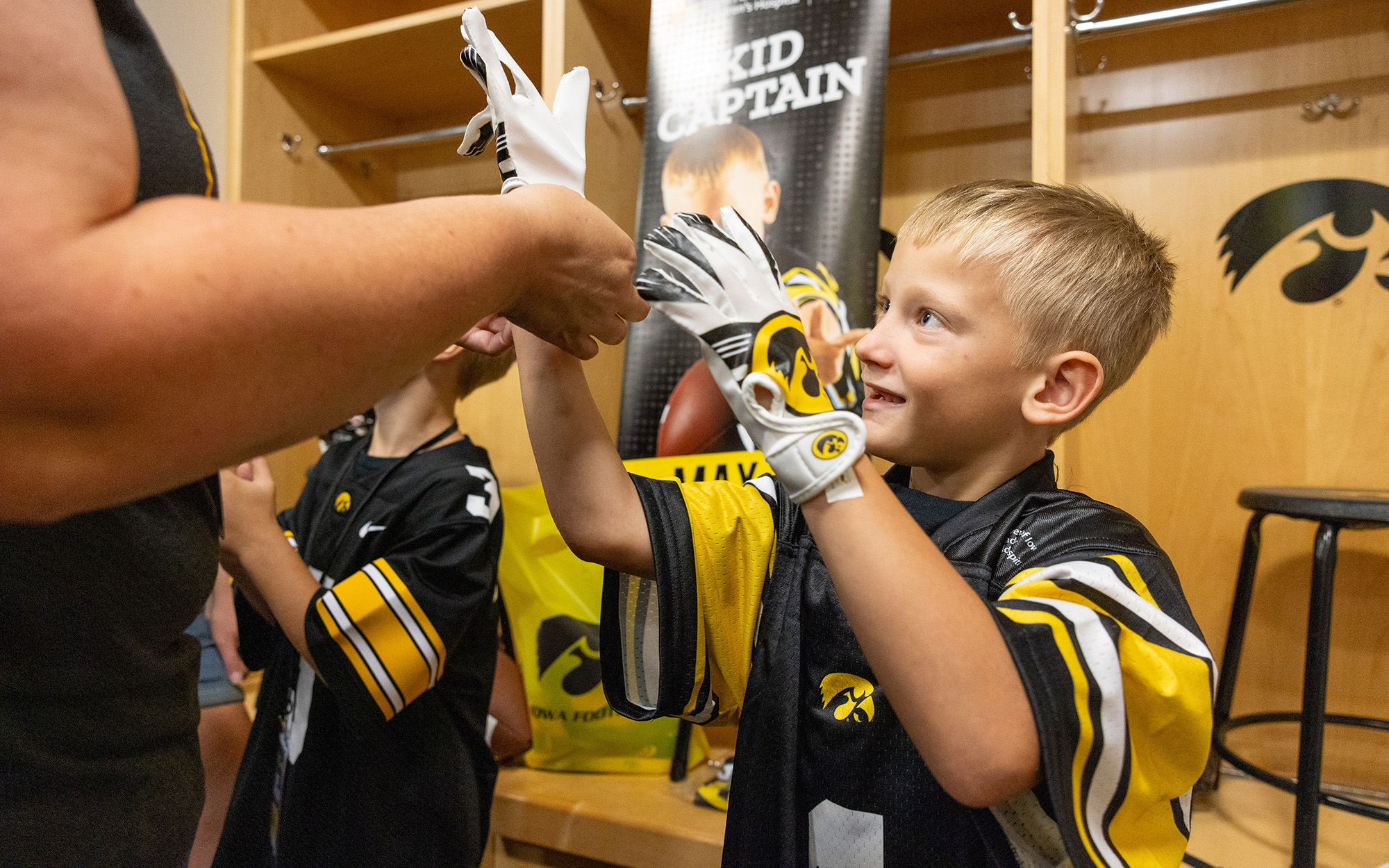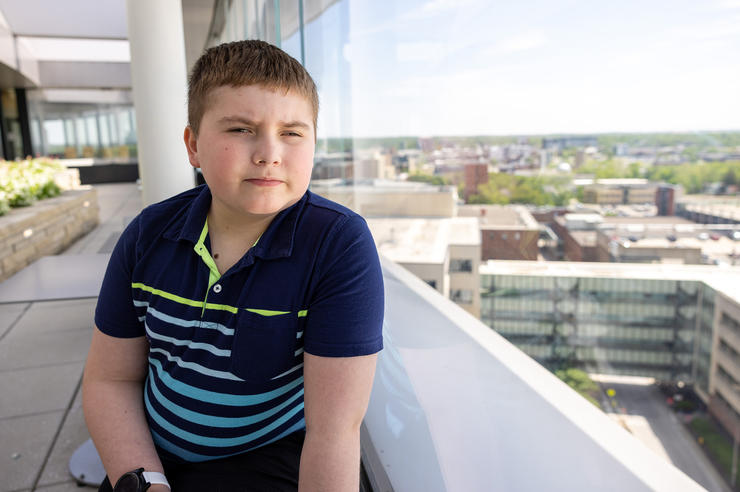Meet Kid Captain Max Schlee

Max Schlee and his twin brother, Cooper, of Farmersburg, Iowa, had quite the chaotic entrance to the world at their local hospital.
“We barely made it to the operating room for the delivery, with Cooper making his appearance in the doorway before I could get to the OR bed,” says their mother, Jamie, who was diagnosed with gestational diabetes and preeclampsia and delivered the boys early, at 36 weeks. “Not to be outdone, Max decided to come feet first, 13 minutes later. Both boys were safely delivered, and we thought our adventure was over, but little did we know that this was just the start.”

University of Iowa Stead Family Children’s Hospital is Iowa’s only nationally ranked children’s hospital, offering all pediatric subspecialties and caring for kids from all 99 counties in Iowa. We provide world-class pediatric care that families trust—and kids deserve.
The boys appeared to be healthy when they were born, but Max was referred to University of Iowa Stead Family Children’s Hospital after the Iowa Newborn Screening Program flagged a rare inherited disorder.
Tests confirmed Max had medium-chain acyl-coenzyme A dehydrogenase deficiency (MCADD), which left untreated can lead to serious consequences including brain damage, coma, and sudden death.
Struggling to nurse
Jamie suffered an eclamptic seizure 24 hours after the twins were born, which kept all three in the hospital longer and allowed time for immediate testing when the newborn screening program results were returned. Typically, families already are discharged by that time.
Also, because Jamie had gestational diabetes, both boys were having their blood sugar checked every two hours. Max’s level was low because he was not able to nurse efficiently.
“He was so tired from the effort of trying to eat, that we switched to feeding him with a syringe when he could not finish his bottle,” Jamie recalls. “Finally, at 24 hours old, the pediatrician noticed that he had a cleft palate.”
Having a cleft palate—where the top of the mouth is split—and trying to nurse is like trying to drink through a straw with a hole in it.
“You can do it, but it takes a lot of effort with little rewards,” Jamie says. “Max was working so hard to eat that he was rapidly losing weight.”
Screening saves lives
Even before the screening results came back, Max had been closely monitored to ensure he was eating, which likely saved his life. MCADD—which occurs in about one in 17,000 newborns in the United States—prevents the breakdown of certain fats needed for energy, leading to dangerously low blood sugar levels. The only “treatment” is to eat.
“They were watching him so closely to make sure he was getting those calories,” Jamie says.
Max was taken for additional testing when the screening results were returned, which revealed he had the genetic disorder. Before that day, Jamie and her husband, Steve, had given little thought to the Iowa Newborn Screening Program, in which a heel prick is used to draw a few drops of a newborn’s blood, to be analyzed for more than 50 disorders. Without screening, the disorders usually are not recognized until the baby is sick, suffering, or may even have already died.
“I had no idea what they were screened for,” Jamie says, adding she is grateful that Iowa offers a courier service and 24/7 analysis from the State Hygienic Laboratory at the University of Iowa. “It can be a matter of life or death.”
Jamie notes that one concern is that new parents will take their baby home—not knowing they have MCADD—and allow the infant to sleep if they are not crying.
“When an MCADD baby is crashing, their body will begin to shut down without parents noticing,” Jamie says. “They will be fine one minute, and then the next, they will be lethargic and non-responsive, and in some cases do not survive.”
“I have gotten calls from Max’s doctors after hours, checking on him to see how he is doing. Those are the things that show us how much they care. I couldn’t imagine a better place for Max’s care to be managed.”
A plan to move forward
Because of the condition’s rarity, Max was referred to UI Stead Family Children’s Hospital, which included meeting with the genetics team, where they were told the disease is manageable with a combination of a specialized diet and supplements.
“There’s no cure,” Jamie says. “The care team allayed so many of our fears and answered all of our questions.”
Max had to be fed every two to three hours for the first four months of his life, and as he got older, was able to go longer between meals.
Any time he gets sick with a “normal” childhood sickness—such as influenza or even a cold or fever—the family shifts into triage mode.
“He must eat every three to four hours and keep it down,” Jamie said. “As you can imagine, when you are vomiting or just feel rotten, you do not want to eat. If Max is unable to keep food down or refuses to eat, we need to bring him into the hospital for IV dextrose. This is the only thing that can hold off a metabolic crisis.”
University of Iowa Stead Family Children’s Hospital is home to the only comprehensive medical genetics and genomics services in the state of Iowa. Our experienced teams contribute to the diagnosis and care of children and adults with rare genetic disorders.
As a part of an academic medical institution, we are committed to the provision of services that rely on the advances in research relating to the genetic basis of human disease. We strive to provide the best, evidence-based and comprehensive health care services to Iowans.
In addition to devising a plan to help with Max’s diagnosis, his care team has been attentive during his more than 40 hospitalizations, numerous appointments, and six surgeries. All these procedures can be very strenuous emotionally.
“There have been many times as I lay in the hospital bed with him that I wondered if this would be the time that he didn’t come home with me,” she says. “It’s very scary and humbling as a parent to know that there is nothing that you can do to fix this. All you can do is pray and hope.”
The best place for care
Max continues to have regular checks at the hospital, but his family says overall he’s pretty healthy.
Now 8 and in second grade, he enjoys soccer, flag football, wrestling, and baseball, and is a good student.
“He’s very, very adventurous. He never has an ‘off’ button,” Jamie says. “He’s always on the go.”
She and her husband consider the staff at UI Stead Family Children’s Hospital as extended family.
“I have gotten calls from Max’s doctors after hours, checking on him to see how he is doing,” Jamie says, citing one doctor who left church to come to the emergency room to see him. “Those are the things that show us how much they care. I couldn’t imagine a better place for Max’s care to be managed.”


